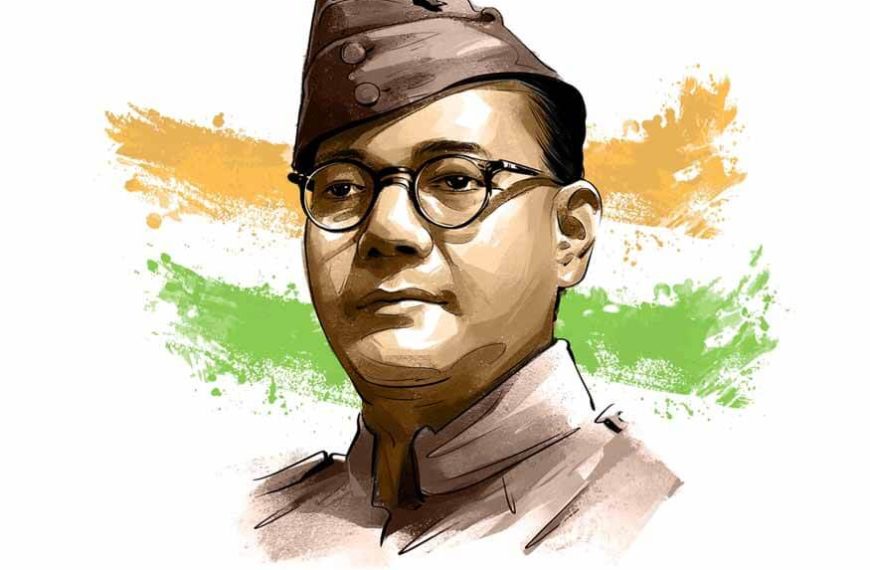Subhash Chandra Bose is a revered icon in Indian history, a luminary who stands alongside numerous great leaders of our nation’s struggle for independence. Mr. Bose was a man defined by his proactive approach, visionary thinking, and audacious spirit, celebrated for his unwavering commitment to India’s quest for freedom. This essay seeks to provide students and kids with comprehensive Subhash Chandra Bose information, a look into the impactful moments in Subhash Chandra Bose history, and an understanding of his immense contributions to the nation.
Early Life:
Subhash Chandra Bose was born against the backdrop of a resplendent Indian culture on 23rd January 1897, in the historical city of Cuttack, Orissa. Hailing from an affluent family, Bose was privileged with access to quality education and resources. This nurturing environment sowed the seeds of nationalism in him at a tender age. His fervour for India’s emancipation became palpable during his academic years. Having honed his foundational knowledge in India, he voyaged to England, aiming for the prestigious Indian Civil Service Examination. Triumphing with a remarkable fourth position, Bose seemed poised for a bureaucratic life. However, the fervent call of the motherland resonated more deeply within him. Choosing patriotism over prestige, he renounced his civil service career, pledging himself to the Indian freedom movement.
The Rise in Politics:
Subhash Chandra Bose’s political journey commenced with his alignment with the Indian National Congress (INC). During this association, he built close ties with eminent leaders like Jawaharlal Nehru. His progressive and sometimes radical ideologies soon made him a distinguished figure within the INC. However, this very radicalism occasionally brought him into ideological conflicts with other INC luminaries, particularly Mahatma Gandhi. As testament to his rising prominence, Bose was elected as the INC president in 1938 and again in 1939. But the ideological rifts within the party became too broad to bridge. Disenchanted and determined to follow his vision, he resigned in 1939 and birthed the Forward Bloc, advocating a more assertive stance for India’s independence.
The Quest for External Support:
As World War II cast shadows across continents, Bose astutely perceived the global shifts and recognised the potential allies in the Axis powers. Driven by the adage “an enemy’s enemy is a friend,” Bose reached out to nations like Germany and Japan, aiming to consolidate opposition against British colonial rule. In 1943, leveraging Japanese patronage, he instituted the Provisional Government of Free India in Singapore. He then spearheaded the Indian National Army (INA), comprising resolute Indian prisoners of war and dedicated expatriates. These forces bravely confronted the British in consequential battles such as Imphal and Kohima. Bose’s rousing war cry, “Tum Mujhe Khoon Do, Main Tumhe Azadi Dunga,” instilled fervent patriotism, mobilising many Indians against the colonial oppressors.
Legacy:
Subhash Chandra Bose’s audacious approach to attaining India’s freedom, while polarising, significantly influenced nationalistic fervour. Post-war, the British trials of INA officers at the iconic Red Fort unintentionally bolstered Indian unity, catalysing protests and events that precipitated India’s liberation in 1947. Bose’s tragic and untimely demise in 1945, under clouded circumstances of a plane crash in Taiwan, has engendered numerous speculations and theories. His passing remains shrouded in mystery. Yet, his enduring influence on India’s struggle for freedom is indelible. Numerous landmarks, institutions, and avenues across India are christened in his honour, immortalising his unparalleled commitment to the nation.
Bose’s Philosophical Ideals:
Beyond the political arena, Bose was a profound thinker who blended socialist, communist, and nationalist thoughts. He envisioned a free India where every citizen, regardless of caste, religion, or background, enjoyed equal rights and opportunities. He admired the socialist models of the Soviet Union and believed in the synthesis of state-controlled industry and agriculture for India’s progress. His ideals, while modern, were rooted in India’s ancient philosophy of Vasudhaiva Kutumbakam (The World is One Family). He aspired for an India that was progressive yet firmly rooted in its rich cultural heritage.
Bose and the Women’s Regiment of the INA:
The creation of the Rani of Jhansi Regiment, an all-women combat force, was one of the most admirable and progressive achievements of Subhash Chandra Bose’s tenure as INA’s commander. This ground-breaking action represented a substantial advancement in gender equality in addition to being a calculated strategy. By creating this regiment, Bose not only challenged the prevalent societal norms but also reinforced his belief in the capabilities and potential of Indian women. He named the regiment after the valiant queen of Jhansi, Rani Lakshmi Bai, who was a symbol of resistance against British rule during the 1857 uprising. The women in this regiment were trained in combat roles and guerrilla warfare and were involved in frontline battles. Their valour and dedication underlined Bose’s vision of an inclusive and progressive India, where women stood shoulder to shoulder with men in every endeavour.
Bose’s Impact on Modern India:
Today, Subhash Chandra Bose’s influence permeates various facets of modern India. His call for unity, bravery, and sacrifice resonates with India’s youth, motivating them to strive for national progress. Several movies, documentaries, and books have been dedicated to his life, perpetuating his message for newer generations. Schools and colleges include his life and teachings in their curricula, ensuring that his ideals are ingrained in the minds of the future torchbearers of the nation. In a rapidly globalising world, Bose stands as a beacon, reminding Indians of their glorious past and inspiring visions for a prosperous future.
Even today, Subhash Chandra Bose remains a paramount figure in Indian history, known for his vibrant leadership. His unwavering dedication, acute perception, and unending desire have made a lasting impression on the country’s conscience. The knowledge left by Subhash Chandra Bose inspires students and young people studying history because it instils in the future generation an appreciation for the sacrifices made and the importance of maintaining an unwavering devotion to one’s principles.
Finally, for young minds eager to learn more about the rich heritage of India’s history and its legendary figures like Subhash Chandra Bose, consider EuroKids. As one of India’s leading chains of pre-schools, EuroKids offers a nurturing environment where children can embark on their learning journey, inspired by the stories and achievements of our great nation’s heroes.
You May Also Like These, – Independence Day Quotes For Kids
















